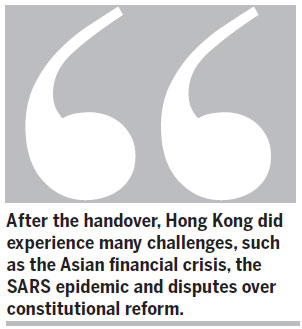Hong Kong triumphs over great challenges again
Updated: 2015-01-05 06:18
By Leung Kwok-leung(HK Edition)
|
|||||||||
Hong Kong experienced many serious challenges in 2014. The past year reminded people again of a very controversial article published in US magazine Fortune before China resumed the exercise of sovereignty of Hong Kong in 1997 which declared that the city was "dead". Although this article painstakingly explained why "Hong Kong as we know it is dead", its prediction was totally disproved by the people of Hong Kong. They are living testament to the reason why "Hong Kong will never die".
The last global financial crisis dragged most Western economies into a recession. Some of them came very close to bankruptcy. But Hong Kong was not only able to survive but to maintain its prosperity. Time magazine, a sister publication of Fortune, ran an article in 2009 describing Hong Kong's economic outlook as "clear, with a few patches of cloud". The optimistic tone of this article might have been meant as an apology for the hasty announcement of Hong Kong's "death" many years earlier. This glowing appraisal of the city's economy was seen as an acknowledgement of Fortune magazine's overly pessimistic forecast of post-handover Hong Kong. Like Fortune's article in 1995, the Time article attracted much international attention.
In the Time article, the author said many people were worried about the city's future after 1997. Some felt it faced great uncertainties. After the handover, Hong Kong did experience many challenges, such as the Asian financial crisis, the SARS epidemic and disputes over constitutional reform. But it remained as vibrant as ever. The author provided five reasons why Hong Kong continues to thrive: 1) the people of Hong Kong are hardworking and motivated; 2) the city has a mature legal system; 3) it has a very transparent government; 4) press freedom which allows for the dissemination of information, and 5) it is fully integrated with the global economy.
Five years after Time magazine published this article, the biggest political storm Hong Kong has seen in the past 17 years occurred in late 2014. It lasted for nearly 90 days. It was deceptively called "Occupy Central with Peace and Love". But it was an illegal movement which bore all the hallmarks of a "color revolution". It also had considerable financial, material and technical assistance from foreign forces. Long before the illegal campaign started, about 1,000 "key players" received training from foreign "experts". The leaders of the campaign tried to convince Hong Kong residents their campaign was "necessary" and any damage resulting from it was "justified".

Chris Patten, the last colonial governor of Hong Kong, was particularly excited about "Occupy". He even went to extraordinary lengths to encourage it. The British Parliament and United States Congress also lent their voices to a chorus of verbal support in the Western press. This was in order to give the "occupiers" a psychological boost. This helped to hoodwink many young people into joining the illegal movement. But the great majority of local residents knew better. They refused to support it.
A strong public rejection of "Occupy" from the very beginning ensured it would fail. Its goal had been to blackmail the central government by threatening to paralyze traffic in Central. The SAR government, supported by Beijing, was able to contain the abusive political movement and end it peacefully after 89 days. This showed that the five reasons for Hong Kong's success mentioned by Time still matter today. It was further proof of Hong Kong's great resilience.
President Xi Jinping told Chief Executive Leung Chun-ying in Beijing last week that the SAR government did a commendable job restoring order. Xi encouraged Leung to maintain social stability and economic prosperity in Hong Kong as well as help the security and development of the nation. The central government is well aware of the real situation in Hong Kong. Xi's words show that Beijing cares greatly about improving people's livelihoods. This is vital to maintaining social stability.
Xi also emphasized the importance of maintaining the rule of law while undertaking constitutional reform in Hong Kong. "Occupy" posed a real threat to the rule of law. Sadly, some diehard "occupiers" are still trying to keep the illegal campaign "alive" by harassing consumers and businesses. The police have promised swift action against them, particularly during public holidays. Bringing the instigators of "Occupy" to justice may be very challenging. Nevertheless, the authorities have an obligation to proceed. This is because the rule of law, social stability and economic prosperity of Hong Kong are at stake.
The author is a veteran journalist based in Hong Kong.
(HK Edition 01/05/2015 page1)